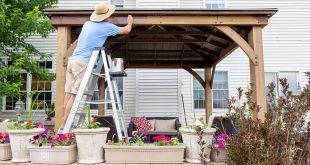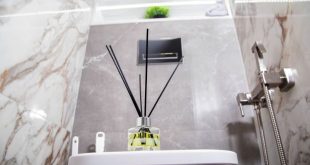Your kitchen is one of the most used rooms in your house, so it’s your responsibility to make sure that it is clean and is always safe to use. If you don’t regularly clean your kitchen, it’ll become dirty and extremely unhygienic to use, and trying to clean it will become very time-consuming.

So, in order to avoid that, make a habit of cleaning your kitchen more often. However, keeping your kitchen clean isn’t the only thing that you need to be careful about. You need to make sure that your kitchen is safe to use by anyone in your house.
Here are 5 tips on how you can keep your kitchen safe and clean:
1. Keep Your Worktops Clean
One of the most common places that need to be kept clean are your kitchen worktops. You prepare all of your food on your worktops which is why you must make sure that it’s clean before and after you prepare your food.
If you don’t keep your kitchen worktops clean, then it will collect bacteria and other harmful germs that can climb into your food while you’re preparing it. This can cause you to get an infection and become sick.
Sometimes we forget to clean the nook and corners of our kitchen worktops, but these areas are where fungi and molds can find a home. If you want to avoid having nasty encounters with these unwanted guests, then be sure to thoroughly clean your worktops regularly. Using Dettol or a homemade eco-friendly cleaning solution can help you get rid of them.
2. Wash Your Kitchen Utensils
Another important tip to keep in mind when trying to maintain a clean and safe kitchen is to make sure that all of your kitchen utensils such as knives, spoons, tongs, and spatulas are washed and cleaned before and after using.
When you use unwashed or dirty kitchen utensils, especially if they’ve already been used on raw foods such as raw meat and eggs, the bacteria that is present in these raw foods can travel to those utensils and can spread quickly to someone who uses those utensils to prepare food or use them to eat something and cause them to become ill.
Using dishwashers to clean your kitchen utensils is the easiest way to go. Dishwashers are very effective because they wash kitchen utensils at high temperatures that can kill bacteria easily. If you don’t own a dishwasher, then just wash your utensils with hot water and soap thoroughly, as that can get rid of the bacteria as well.
3. Keep Your Washcloths Clean
Bacteria don’t just grow in kitchen utensils and nooks of worktops; believe it or not, they also grow in other things such as dirty washcloths and sponges. If you use those dirty washcloths, then you can spread bacteria and germs to your kitchen utensils and other countertops. That’s why it’s important to wash them and leave them to dry as frequently as you can before using them to wash your things in the kitchen.
There is also another way to stop it from spreading, and it’s by keeping 2 separate washcloths, one for washing dishes and the other for cleaning countertops and cutting boards.
You could use disposable kitchen towels as well; they’re beneficial for reducing the spread of bacteria to other places in the kitchen because you only have to use them for a specific activity in the kitchen, such as cleaning the worktops or wiping the wet dishes dry and then discarding them immediately without using them on anything else.
4. Get Regular Gas Checks
There have been many incidents in the kitchen, such as explosions or gas leaks due to the gas appliances being very old and not functioning properly or not being checked thoroughly.
That’s why it’s necessary that you have monthly gas safety checks performed by a professional Gas Safe Engineer on all of your kitchen gas appliances, such as gas stoves, gas cylinders, and other appliances that use LPG. This way, you can easily identify which of your gas appliances need to be updated or removed, which can prevent gas leaks.
You can only obtain a gas certificate if the gas safety check is carried out by the registered Gas Safe Engineer and not by yourself or someone who isn’t registered. A gas certificate costs range from £60-£90 in the UK.
Another way you can prevent gas leaks from happening is by getting gas detectors installed in your home as they can immediately detect when a gas leak occurs and also alert you.
5. Install Gas and Smoke Detectors in Your Kitchen
Smoke and gas leaks in kitchens are a lot more common than you think. However, some people don’t have the means of being able to identify these gas leaks in their kitchens. Sure, there are some obvious signs that they can notice, such as smell and windows fogging up as well as difficulty in breathing, but how quick are they able to notice these signs before it’s too late?
There are also some signs that the human eye can’t detect; that’s why you need proper technologies that can detect these signs quickly and warn you. These technologies are called smoke and gas detectors.
As stated in the above point, they can pick up and detect signs of smoke and gas leaks in the kitchen very quickly, and once they do, they have an alarm that alerts all of the residents in the house. There are different types of gas and smoke detectors, such as portable and fixed. By having smoke and gas detectors in your home, you’re prioritizing not only your safety but your family members’ safety as well.
Now You Know 5 Great Tips to Keep Your Kitchen Clean & Safe
The kitchen’s cleanliness should be the first priority, whether it’s your home kitchen or a commercial one. Make sure you have the right tools for your kitchen sanitation. Couple that with our effective tips; you can surely guarantee the cleanliness and safety of your kitchen every time you use it.
 World inside pictures Collect and share the best ideas that make our life easier
World inside pictures Collect and share the best ideas that make our life easier








